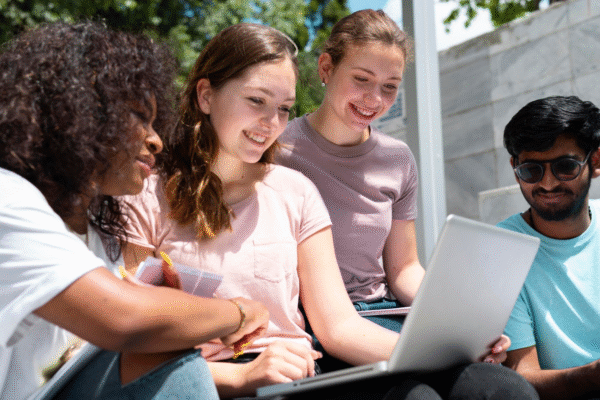In 2025, being a student feels like juggling flaming torches while riding a unicycle—challenging, but oh-so-rewarding when you get it right. With technology evolving faster than you can say “syllabus,” and distractions lurking around every corner (hello, endless TikTok scrolls), mastering effective learning strategies is more crucial than ever. I remember my own college days, frantically scribbling notes in a lecture hall, only to realize later I’d retained about as much as a goldfish. That’s why I’ve poured my experience as an educator and lifelong learner into this guide, packed with seven smart learning hacks tailored for students navigating the wild academic landscape of 2025. These strategies are practical, backed by research, and designed to help you study smarter, not harder. Let’s dive in and make your brain a lean, mean, knowledge-absorbing machine.
Why Learning Hacks Matter in 2025
The world of education has transformed dramatically, with AI-driven tools, virtual classrooms, and hybrid learning environments becoming the norm. Students today face unique challenges: information overload, shorter attention spans, and the pressure to stay ahead in a hyper-competitive job market. These hacks are your toolkit to cut through the noise, optimize your study sessions, and boost retention—all while keeping stress at bay.
Hack 1: Leverage AI-Powered Study Tools
AI is no longer just a buzzword; it’s your personal study buddy in 2025. Tools like Quizlet’s AI-enhanced flashcards, Notion’s study planners, or Grammarly’s writing assistant can streamline your workflow. For example, I once used an AI tool to summarize a dense 50-page research paper into key points in minutes, saving me hours of slogging through jargon.
- Best Tools: Quizlet (flashcards), Notion (organization), Grammarly (writing).
- Where to Get Them: Available on their official websites or app stores.
- Pro Tip: Use AI to generate practice questions tailored to your course material.
Hack 2: Master the Pomodoro Technique with a Twist
The Pomodoro Technique—25 minutes of focused work followed by a 5-minute break—is a classic, but in 2025, apps like Forest or Focus@Will add gamification and brainwave music to keep you locked in. I tried this during a grueling finals week, planting a virtual tree for every study session. By the end, I had a digital forest and a 4.0 GPA to show for it.
- How It Works: Set a timer for 25 minutes, work uninterrupted, then take a short break.
- Why It’s Effective: Prevents burnout and boosts focus.
- 2025 Twist: Use apps with rewards or music to enhance engagement.
Hack 3: Create a Distraction-Free Digital Environment
Distractions are the arch-nemesis of productivity. In 2025, tools like Freedom or Cold Turkey let you block distracting apps and websites during study time. I once caught myself doom-scrolling X during a study session—30 minutes gone! Blocking social media apps turned my phone from a time-suck into a tool.
- Tools to Try: Freedom (cross-device blocking), Cold Turkey (website blocker).
- Where to Find: Download from their official sites or app stores.
- Quick Tip: Schedule blocks during peak study hours to stay disciplined.
Hack 4: Use Active Recall for Long-Term Retention
Active recall—testing yourself on material rather than passively rereading—has been a game-changer since I discovered it in a psychology class. Instead of highlighting my textbook into a neon rainbow, I started quizzing myself with flashcards. Studies show active recall can improve retention by up to 50% compared to passive review.
- How to Do It: Create questions from your notes and test yourself regularly.
- Best Tools: Anki (spaced repetition), Quizlet (AI-generated quizzes).
- Why It Works: Forces your brain to retrieve information, strengthening memory.
Hack 5: Gamify Your Learning with Apps
Turning studying into a game makes it less of a chore. Apps like Duolingo (for languages) or Kahoot (for any subject) use rewards and leaderboards to keep you hooked. I once competed with friends on Kahoot to memorize biology terms, and the friendly rivalry made those late-night study sessions feel like a party.
- Top Apps: Duolingo (language learning), Kahoot (quiz-based learning).
- Where to Access: App stores or web platforms.
- Fun Factor: Compete with classmates or set personal high scores.
Hack 6: Optimize Note-Taking with Digital Tools
Gone are the days of scribbling illegible notes. In 2025, digital note-taking apps like Obsidian or Evernote let you organize thoughts with tags, links, and search functions. I switched to digital notes after losing a notebook before a big exam—never again! These tools sync across devices, ensuring you’re always prepared.
- Best Tools: Obsidian (linked notes), Evernote (searchable notes).
- Pro Tip: Use templates for lectures to stay consistent.
- Where to Get: Download from official websites or app stores.
Hack 7: Prioritize Sleep and Brain Health
No hack trumps a well-rested brain. Research from the National Sleep Foundation shows that 7–9 hours of sleep boosts memory consolidation. I learned this the hard way after pulling an all-nighter and bombing a quiz. Pair quality sleep with brain-boosting foods like blueberries or walnuts for maximum impact.
- Sleep Tips: Stick to a consistent sleep schedule, avoid screens before bed.
- Brain Foods: Include omega-3-rich foods like salmon or nuts.
- Why It Matters: Sleep enhances focus, memory, and emotional resilience.
Comparison: Traditional vs. Modern Learning Hacks
| Aspect | Traditional Methods | 2025 Learning Hacks |
|---|---|---|
| Note-Taking | Pen and paper, prone to loss | Digital apps like Obsidian, syncable |
| Study Focus | Long, uninterrupted sessions | Pomodoro with gamified apps |
| Retention | Rereading and highlighting | Active recall with spaced repetition |
| Distraction Control | Manual willpower | Apps like Freedom for blocking sites |
| Engagement | Textbooks and lectures | Gamified apps like Kahoot |
Pros and Cons of 2025 Learning Hacks
Pros:
- Efficiency: AI tools and apps save time and personalize learning.
- Engagement: Gamification makes studying fun and interactive.
- Accessibility: Most tools are affordable or free, available on multiple platforms.
Cons:
- Learning Curve: Some apps require time to master.
- Tech Dependence: Over-reliance on digital tools can be a drawback if tech fails.
- Cost: Premium versions of some apps may require subscriptions.
People Also Ask (PAA) Section
What are the best study apps for students in 2025?
Apps like Quizlet, Notion, and Anki lead the pack for their AI-driven features and ease of use. They cater to flashcards, organization, and spaced repetition, respectively, making them perfect for students juggling multiple subjects.
How can students stay focused while studying?
Using the Pomodoro Technique with apps like Forest, combined with distraction-blocking tools like Freedom, helps maintain focus. Creating a dedicated study space free from notifications is also key.
Why is active recall effective for learning?
Active recall strengthens neural connections by forcing your brain to retrieve information. It’s like giving your memory a workout, making it more effective than passive methods like rereading.
Where can I find free study tools for students?
Websites like Quizlet.com, Ankiapp.com, and Notion.so offer free versions of their tools. Many universities also provide access to learning platforms like Canvas or Blackboard.
How does sleep impact academic performance?
Sleep consolidates memories and improves focus, directly impacting grades. Lack of sleep can reduce cognitive function, making it harder to retain information or solve problems.
FAQ Section
Q: How do I choose the right study app for my needs?
A: Identify your primary need—flashcards, organization, or focus. For example, Quizlet is great for memorization, while Notion excels at organizing schedules. Try free versions first to see what fits your workflow.
Q: Can I combine multiple learning hacks?
A: Absolutely! Pair active recall with Pomodoro sessions or use AI tools to create gamified quizzes. Combining hacks creates a personalized system that maximizes efficiency.
Q: Are free study tools as effective as paid ones?
A: Many free tools, like Anki or Quizlet’s basic version, are highly effective. Paid versions often add convenience or advanced features, but free options can suffice for most students.
Q: How do I avoid burnout while studying?
A: Use Pomodoro breaks to rest, prioritize sleep, and incorporate fun elements like gamified apps. Regular exercise and short mindfulness sessions can also recharge your mental battery.
Q: What’s the best way to start using active recall?
A: Begin by turning your notes into questions. Use apps like Anki to schedule reviews, starting with small batches to avoid overwhelm. Consistency is key to seeing results.
Optimizing Your Study Routine: A Step-by-Step Plan
- Assess Your Needs: Identify weak areas (e.g., focus, retention).
- Choose Tools: Pick 1–2 apps from the hacks above to test.
- Set a Schedule: Use Pomodoro to structure study sessions.
- Incorporate Active Recall: Create flashcards or quizzes weekly.
- Block Distractions: Use Freedom or Cold Turkey during study time.
- Prioritize Sleep: Aim for 7–9 hours nightly to boost performance.
- Review and Adjust: Track progress with tools like Notion and tweak as needed.
Where to Get Started
- Free Resources: Check out Quizlet.com, Ankiapp.com, or Notion.so for free tools.
- Paid Options: Consider premium versions of Grammarly or Forest for advanced features.
- University Resources: Many schools offer free access to platforms like Canvas or JSTOR.
Final Thoughts
These seven learning hacks aren’t just about surviving the academic jungle of 2025—they’re about thriving in it. By leveraging AI tools, mastering focus techniques, and prioritizing brain health, you can transform studying from a slog into a superpower. My own journey from chaotic note-taker to organized learner taught me that small, smart changes make a big difference. So, pick one hack, try it today, and watch your grades (and sanity) soar. What’s your favorite study trick? Share it with your friends and start a learning revolution!





